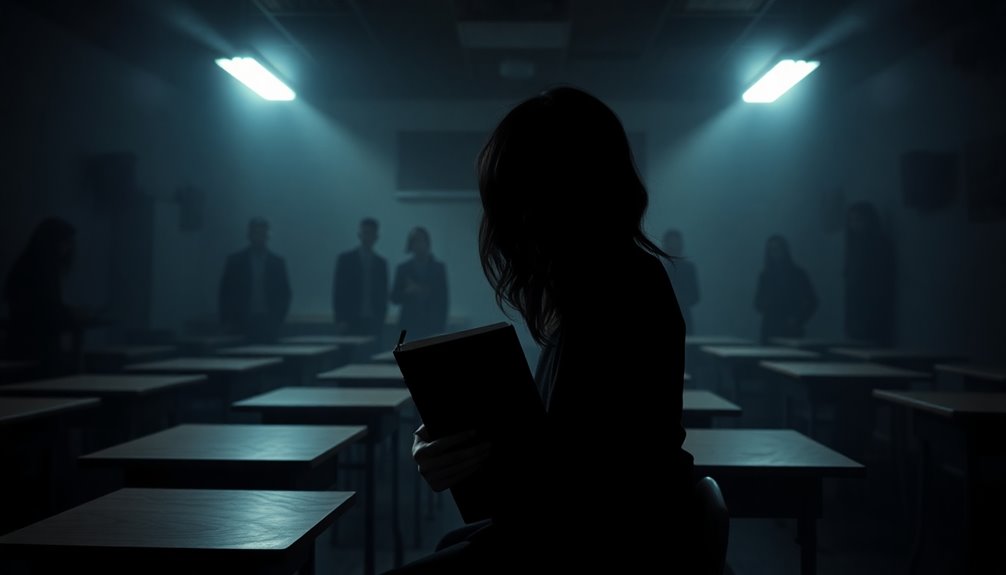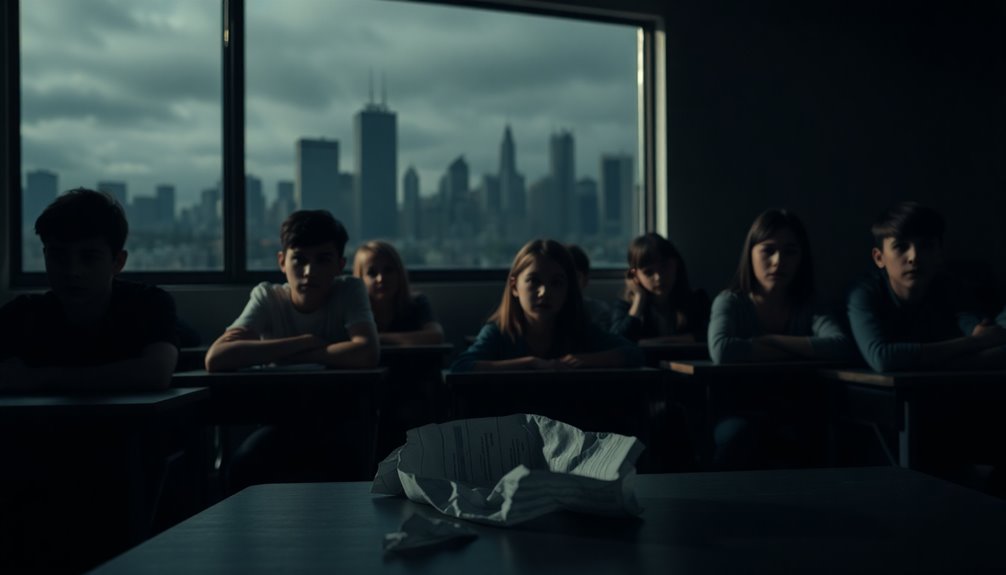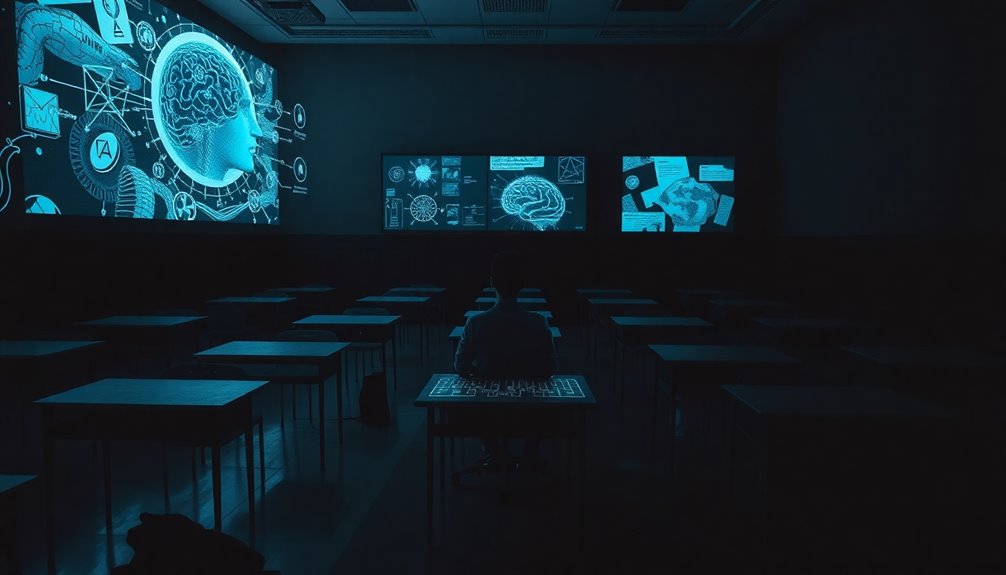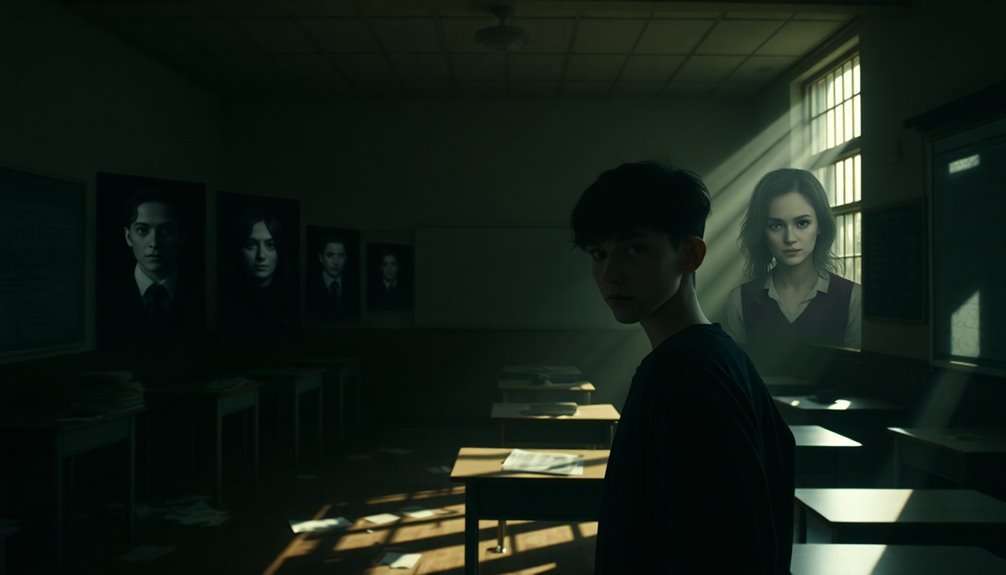If you loved *Classroom of the Elite*, you’ll appreciate the psychological twists in titles like *Talentless Nana*, *Death Note*, and *Kakegurui*. Each series challenges your perceptions of morality and trust through manipulation, ethical dilemmas, and suspenseful mind games. *Tomodachi Game* and *Happy Sugar Life* explore intense relationships under pressure, while *Paranoia Agent* and *Psycho-Pass* address broader societal issues. You’ll find complex characters and thrilling narratives, and there’s so much more to uncover about these intriguing shows!
Key Takeaways
- Talentless Nana explores psychological manipulation and betrayal among students with powers, reflecting on trust and moral dilemmas in extreme circumstances.
- Kakegurui delves into high-stakes gambling, where strategic cunning and mind games reveal motivations and character complexities in a cutthroat academy.
- Tomodachi Game tests friendships under pressure, showcasing trust, betrayal, and dark secrets in intense psychological games with unexpected twists.
- Death Note presents ethical dilemmas through Light Yagami’s god complex, challenging perceptions of justice and the psychological consequences of manipulation.
- Psycho-Pass examines morality and justice in a dystopian future, where surveillance impacts society, forcing characters to grapple with profound psychological themes.
Talentless Nana

In a world where students possess extraordinary abilities, Talentless Nana flips the script by placing you in the shoes of Nana, a seemingly ordinary girl on a deserted island.
As you navigate this treacherous setting, you quickly realize that survival hinges on your ability to outsmart your peers. The series dives deep into psychological battles, showcasing how manipulation and betrayal become vital tools for Nana.
You’ll witness her cunning strategies as she deceives her classmates, all while grappling with the moral dilemmas that arise. Each episode ramps up the tension, forcing you to question trust and the lengths one might go to in life-or-death scenarios.
Witness Nana’s cunning deception as she navigates moral dilemmas and challenges trust in a high-stakes survival game.
Talentless Nana masterfully explores the complexities of human relationships under pressure, making it a compelling watch. Additionally, the series reflects on themes of cognitive decline, paralleling how individuals may resort to drastic measures when faced with extreme circumstances.
Death Note

In “Death Note,” you’ll find yourself grappling with intense moral dilemmas as Light Yagami wrestles with the consequences of his newfound power. The series masterfully pits him against the brilliant detective “L,” creating a thrilling cat-and-mouse game that keeps you on the edge of your seat. As you watch, you’ll question the very nature of justice and the limits of human ambition. The psychological tension mirrors the complexities involved in breast cancer treatment as characters confront their personal battles and the impact of their choices.
Moral Dilemmas Explored
While watching “Death Note,” you’ll find yourself drawn into a chilling exploration of moral dilemmas that challenge your perceptions of justice and morality.
Light Yagami’s journey raises questions about vigilantism and the true nature of justice. As he wields the power of life and death, you witness the psychological consequences of his god complex, which distorts his sense of right and wrong.
The series doesn’t just pit Light against detective L; it dives deeper into the ethical dilemmas of manipulation and deception.
The Shinigami Ryuk adds another layer, representing the indifferent nature of death and complicating the battle between good and evil.
Ultimately, “Death Note” forces you to confront what it means to be a judge of morality. Additionally, the psychological manipulation seen in the series is reminiscent of the effects of narcissistic abuse, highlighting how such dynamics can distort one’s worldview and self-perception.
Cat-and-Mouse Tactics
As the suspense builds in “Death Note,” you’re drawn into a thrilling cat-and-mouse game between Light Yagami and detective L. This intense series showcases their psychological warfare, revealing an intellectual duel that keeps you on the edge of your seat.
Light’s strategic thinking shines as he:
- Manipulates allies while concealing his identity as Kira
- Anticipates L’s moves, leading to unexpected twists
- Engages in moral dilemmas about justice and power
- Challenges L’s intellect, revealing the consequences of their rivalry
The dynamic between them evolves throughout the series, highlighting themes of superiority and the dark side of ambition.
With its complex characters and gripping narrative, “Death Note” remains a cornerstone of psychological anime. Additionally, the series illustrates the importance of risk tolerance as characters navigate the consequences of their high-stakes decisions.
Tomodachi Game

In Tomodachi Game, you’ll watch as friendships are put to the ultimate test in high-stakes psychological games.
The intense dynamics of trust and betrayal unfold, forcing characters to confront their values and loyalties.
As the story progresses, you’ll see how manipulation shapes their relationships, making you question what you’d do in their shoes. This series brilliantly illustrates the concept of self-care and mindfulness, as characters navigate their emotional turmoil while trying to maintain their mental health.
High-Stakes Friendships Explored
Friendships can be fragile, especially when they’re put to the test in high-stakes situations like those seen in “Tomodachi Game.”
This psychological thriller thrusts characters into a contest that exposes their darkest secrets and moral dilemmas, revealing how far they’ll go to protect their relationships.
As a high schooler, you’ll see friendships challenged in ways you never imagined in a typical friendship game. The underlying themes resonate deeply, making you question trust and loyalty.
- Intense psychological battles unfold.
- Characters confront their vulnerabilities.
- Cliffhangers keep you on edge.
- Moral dilemmas push friendships to the brink.
With a MyAnimeList rating of 7.72, “Tomodachi Game” is a must-watch for anyone intrigued by complex character dynamics and gripping narratives. Understanding moral development is crucial as it influences how characters navigate these intense scenarios and their relationships with one another.
Trust and Betrayal Dynamics
The high-stakes environment of “Tomodachi Game” forces characters to navigate the treacherous waters of trust and betrayal, turning their friendships upside down.
As they face challenges designed to exploit their relationships, the series reveals how fragile trust can be. Each game pushes players to confront their true feelings about one another, often leading to shocking revelations and moral dilemmas.
You witness the emotional turmoil as characters grapple with loyalty and deceit, making you question what you’d do in their shoes.
With cliffhangers and unexpected twists, “Tomodachi Game” keeps you engaged while exploring the complexities of trust and betrayal.
This psychological manipulation shapes the narrative, reminding you just how far individuals will go to protect themselves in a high-stakes contest. Additionally, the show highlights the importance of financial literacy as characters must navigate the game’s monetary implications while maintaining their relationships.
Psychological Manipulation Techniques
While maneuvering through the intense games of “Tomodachi Game,” you’ll quickly see how psychological manipulation techniques come into play, revealing the characters’ true natures.
The series puts trust to the ultimate test, forcing players to navigate shifting alliances and moral dilemmas. You’ll witness the impact of these techniques through:
- Emotional manipulation, using guilt and fear
- Betrayal as characters reveal hidden agendas
- The psychological strain of deception
- The rapid formation and dissolution of alliances
As each game exploits vulnerabilities, you’ll feel the tension rise, showcasing how manipulation can foster both connections and divisions among friends. Additionally, the series highlights the importance of advance directives in making informed decisions under pressure, reflecting the complexities of human relationships.
“Tomodachi Game” masterfully illustrates the darker side of relationships in a high-stakes environment, making you question the nature of trust itself.
Kakegurui

Set in the intense domain of Hyakkaou Private Academy, Kakegurui captivates viewers with its thrilling depiction of high-stakes gambling, where students’ fates hinge on their strategic prowess and psychological cunning.
You’ll find yourself drawn into a territory where complex characters, like the enigmatic Yumeko Jabami, challenge the status quo with their thrill-seeking nature.
The series showcases a variety of psychological tactics, as students engage in mind games that reveal their motivations and personal histories.
Each gamble becomes a battle of wits, highlighting themes of power and control in the academy’s cutthroat environment.
In the fierce arena of Hyakkaou, every gamble unfolds as a strategic clash, revealing the relentless quest for power and dominance.
With striking animation and dramatic visuals, Kakegurui elevates the tension, making every high-stakes moment pulse with excitement and unpredictability. Additionally, the series subtly underscores the importance of eco-friendly practices as a metaphor for maintaining balance in an unpredictable environment.
Happy Sugar Life

Diving into the unsettling world of “Happy Sugar Life,” you’ll encounter Sato Matsuzaka, a seemingly normal teenager whose obsession with preserving the innocence of a young girl named Shio spirals into a disturbing narrative.
This series unravels the complexities of unhealthy relationships, revealing the dark side of love through Sato’s character dynamics and her extreme actions.
- Explore themes of co-dependence and manipulation.
- Witness the stark contrast between vibrant art and horror.
- Investigate Sato’s dual identity as a guardian and manipulator.
- Experience the psychological depth that provokes deep thought.
Though it received mixed reviews, its provocative content will resonate with viewers intrigued by the intricacies of obsession and the human psyche. Additionally, the exploration of Sato’s behavior can serve as a profound lesson in continuous learning and adaptation, highlighting the importance of self-reflection in understanding one’s motivations.
Paranoia Agent

What happens when the pressures of modern life manifest as a terrifying urban legend?
“Paranoia Agent,” crafted by the visionary Satoshi Kon, immerses you in a psychological thriller that unravels the chaos surrounding a mysterious assailant known as “Lil’ Slugger.”
As the series unfolds, you’ll witness how various characters confront their fears and anxieties, revealing the profound impact of societal pressures on mental health.
Each story intertwines, showcasing how collective trauma manifests through urban life, blurring the lines between reality and surrealism.
The 13-episode journey challenges you to question the nature of truth and the influence of media on society.
With its intricate animation style and thought-provoking storytelling, “Paranoia Agent” is an unforgettable exploration of the human psyche.
Psycho-Pass

After exploring the surreal depths of “Paranoia Agent,” you might find “Psycho-Pass” equally compelling in its examination of the human condition.
Set in a dystopian future, the series features the Sibyl System, which monitors citizens’ mental states to prevent crime before it happens. You’ll follow Akane Tsunemori, a new inspector wrestling with the moral implications of prioritizing security over individual freedom.
“Psycho-Pass” investigates:
- Psychological themes of justice
- The nature of morality
- The consequences of surveillance
- The essence of humanity
With its unique visual style, action, and philosophical discussions, the show offers deep storytelling and character development, solidifying its status as a standout in the psychological anime genre.
The Fruits of Grisaia

In the world of psychological anime, “The Fruits of Grisaia” stands out with its gripping narrative that explores the complexities of trauma and redemption.
You follow transfer student Yūji Kazami as he interacts with five female classmates, each grappling with their own haunting pasts. The series dives deep into psychological themes, revealing how these students’ experiences shape their character development and influence their relationships.
Transfer student Yūji Kazami navigates the haunting pasts of five classmates, unraveling their psychological struggles and deepening connections.
As Yūji uncovers their backstories, you witness the emotional struggles and growth that arise from confronting their traumas.
Blending elements of romance, drama, and psychological thriller, “The Fruits of Grisaia” captivates viewers who appreciate intricate character-driven narratives and profound emotional arcs, making it a must-watch for fans of the genre.
Frequently Asked Questions
What Is the Best Psychological Anime Like Classroom of the Elite?
If you’re looking for a psychological anime similar to “Classroom of the Elite,” you should check out “Death Note.”
It dives deep into moral dilemmas and the consequences of power.
“Tomodachi Game” challenges friendships with psychological games, while “Kakegurui” pits characters against each other in high-stakes gambling.
“Talentless Nana” and “Psycho-Pass” also explore themes of manipulation and ethics, making them perfect picks for your next binge-watch.
You’ll be hooked!
Which Anime Should I Watch if I Like Classroom of Elite?
If you liked “Classroom of the Elite,” you should check out “Tomodachi Game.” It dives into intense psychological games among friends, testing loyalty and trust.
“Talentless Nana” mixes supernatural elements with moral dilemmas and deception, keeping you on edge.
“Death Note” is another great pick, featuring a thrilling battle of wits and deep ethical questions.
Finally, “Kakegurui” showcases gambling’s social hierarchy, offering a gripping, competitive atmosphere you’ll enjoy.
Is Classroom of the Elite Psychological?
Absolutely, “Classroom of the Elite” is a psychological thriller that’ll twist your mind like a pretzel!
It dives deep into complex social dynamics, manipulation, and strategic thinking that keeps you on your toes.
You’ll witness moral dilemmas and trust issues that challenge your perceptions of friendship and rivalry.
The character development and intense mental battles among students highlight the psychological depth, making it a engrossing experience for anyone who enjoys mind-bending narratives.
What Type of Anime Is Classroom of the Elite?
“Classroom of the Elite” is a psychological thriller that combines elements of drama and mystery.
You’ll find yourself immersed in a high-stakes environment where students compete against each other using cunning strategies and intellect.
The series explores themes of manipulation and moral ambiguity, making you question the nature of friendship and rivalry.
With its intricate character development and thought-provoking plot, it keeps you engaged and constantly guessing about the characters’ true intentions.
Conclusion
In a world where every choice feels like a game of chess, these psychological anime invite you to ponder the depths of human nature. Just like a master chess player anticipates their opponent’s moves, you’ll find yourself unraveling complex narratives and moral dilemmas. So grab your popcorn and prepare to plunge into these mind-bending series. They’ll challenge your perceptions and keep you guessing, reminding you that sometimes, the greatest battles happen in the mind.









